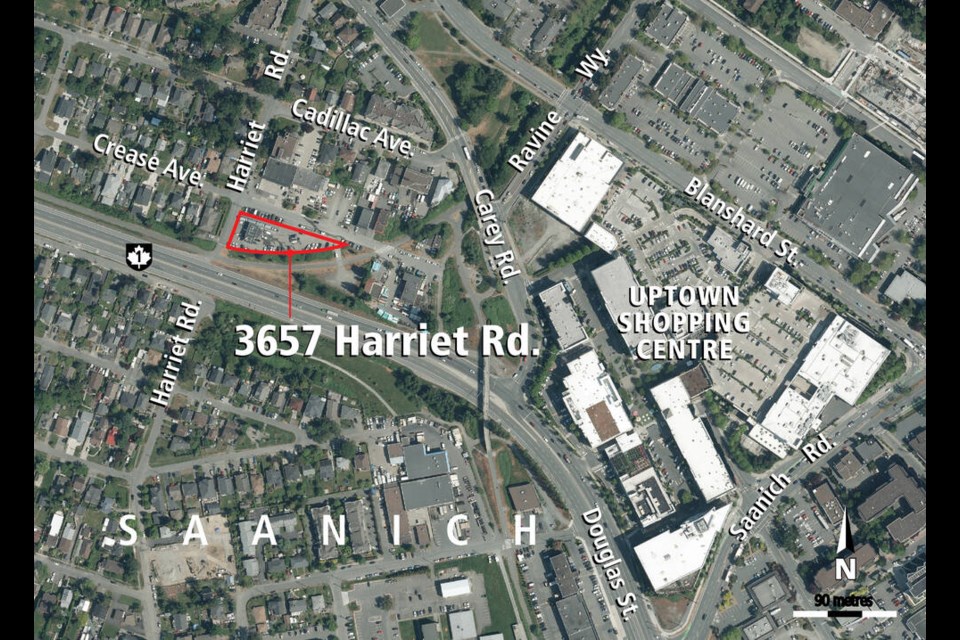The province is planning a transit-oriented housing development near Uptown with “hundreds” of new homes.
The development plan was announced Monday after the provincial government finalized the purchase of two properties for a combined cost of $9.3 million.
The two parcels of land near Uptown were purchased through the $394-million property acquisition fund operated by the Transportation Ministry.
Premier David Eby said the plan is to build “hundreds” of new homes plus a transit hub, retail and commercial, and amenities such as child care and public spaces.
“Our communities are growing quickly, and people need affordable homes close to public transit, so they can get to where they need to go — and get ahead in life,” said Eby. “That’s why our government is buying up land around transit hubs and making sure that the homes that are built there are affordable to people who actually use transit to get to school, work and appointments. This new development in Saanich will create a vibrant, connected community where people can find everything they need at their doorstep.”
Rob Fleming, minister of Transportation and Infrastructure, said the central location of the two properties next to Highway 1, the Galloping Goose Regional Trail and a shopping centre is an “ideal place for a bus exchange and much-needed new housing in a transit-oriented community.”
The new development will be designed to integrate with the Lochside and Galloping Goose regional trails to make it a hub for active transportation and transit, with connections to downtown Victoria, the University of Victoria, the West Shore and the Saanich Peninsula, the province said.
Saanich Mayor Dean Murdock called the Uptown-Douglas area the perfect location for a high-density, transit-oriented development and regional transit hub.
Eby said the government got involved in the real estate development because of a “paradox” where people who use transit in B.C. are often priced out of homes close to transit.
The province will retain ownership of the land, while housing developed at the sites would be done as leaseholds or rentals, although the exact mix of housing has yet to be decided.
“One of the pieces that we’ve really seen … is that the property values that immediately are adjacent to transit development go up in value,” Eby said. “And when that land value goes up, the housing that’s ultimately built on that site also ends up being more expensive.
“With government actually buying the land near transit hubs like this … we can shape development in a way that supports people who actually use transit actually being able to live close to the transit that they depend on.”
No timeline for the development’s construction or completion has been released.
A pie-shaped 3,595-square-foot lot at 28 Crease Ave. previously occupied by Ryzuk Geotechnical was sold to the province last month for $1.81 million. The property was valued in 2023 at $813,000 by the B.C. Assessment Authority.
In January, the Transportation Ministry spent $7.5 million for an almost half-acre site at 3657 Harriet Rd. that had been assessed at $3.3 million. The long pie-shaped lot is currently being used by Budget Car Rental.
The province said the negotiated purchase price represented fair market value at the time of purchase. An independent appraisal was carried out to ensure good value for taxpayers, something that is standard practice when the province buys land, the ministry said.
Uptown shopping centre is one of 130 sites in B.C. that were designated in December as transit-oriented development areas by the Ministry of Housing, as part of the province’s efforts to boost home construction to ease a shortage of affordable homes.
Transit-oriented development refers to complete communities with residential, business and leisure space close to public transit, the ministry said.
The goal is to encourage people to use transit rather than relying exclusively on private vehicles.
— With files from Carla Wilson, Times Colonist
>>> To comment on this article, write a letter to the editor: [email protected]



